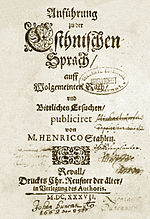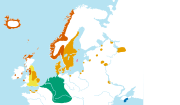In linguistics, the partitive is a word, phrase, or case that indicates partialness. Nominal partitives are syntactic constructions, such as "some of...
27 KB (3,732 words) - 03:26, 6 July 2024
The partitive case (abbreviated PTV, PRTV, or more ambiguously PART) is a grammatical case which denotes "partialness", "without result", or "without...
9 KB (1,157 words) - 13:30, 4 February 2024
Partitive plural is a grammatical number that is used to modify a noun which represents a part of some whole amount, as opposed to the comprehensive plural...
2 KB (143 words) - 18:37, 8 March 2024
Article (grammar) (redirect from Partitive article)
coffee? For more information, see the article on the French partitive article. Haida has a partitive article (suffixed -gyaa) referring to "part of something...
48 KB (3,652 words) - 16:15, 27 September 2024
Genitive case (redirect from Partitive genitive)
indicated by the noun being modified ("Janet's husband") composition (see Partitive): substance ("a wheel of cheese") elements ("a group of men") source ("a...
35 KB (4,368 words) - 17:28, 24 September 2024
Finnish noun cases (section Partitive)
of the partitive plural is rather variable, but the basic principle is to add '-i-' to the inflecting stem, followed by the '-(t)a' partitive ending....
23 KB (2,687 words) - 15:22, 2 August 2024
Partible inheritance (redirect from Partitive inheritance)
Partible inheritance, sometimes also called partitive, is a system of inheritance in which property is apportioned among heirs. It contrasts in particular...
3 KB (324 words) - 09:54, 17 August 2024
assume partitive function in Sakha; no other Turkic language has partitive suffix save for Khalaj and (nearly-extinct) Tofa. Sakha partitive is similar...
71 KB (4,137 words) - 11:33, 23 September 2024
English the; an indefinite article, corresponding to English a/an; and a partitive article, used roughly like some in English. The French definite article...
15 KB (1,498 words) - 13:22, 9 August 2024
Quotition and partition (redirect from Quotative and partitive)
In quotitive division one asks "how many parts are there?" while in partitive division one asks "what is the size of each part?" In general, a quotient...
4 KB (660 words) - 00:42, 28 April 2024
nominative and partitive, plural nominative, singular partitive: plural genitive, plural genitive: plural cases except nominative and partitive. Singular nominative...
63 KB (6,561 words) - 18:43, 22 September 2024
null pronouns for place and partitives, but Catalan, French, Occitan, and Italian have overt pronouns for place and partitive. Arabic is considered a null-subject...
46 KB (5,858 words) - 19:25, 11 September 2024
the partitive case. In morphosyntactic alignment terms, both do the accusative function, but the accusative object is telic, while the partitive is not...
16 KB (1,870 words) - 07:10, 15 June 2024
a fraction are known linguistically as "partitive numerals". In spoken English, ordinal numerals and partitive numerals are identical with a few exceptions...
41 KB (4,495 words) - 15:21, 1 September 2024
respects including: Shared morphology: case suffixes such as genitive -n, partitive -(t)a / -(t)ä ( < Proto-Uralic *-ta, originally ablative), essive -na...
96 KB (9,289 words) - 07:28, 29 September 2024
latter the partitive case. This resulted in the rise of the telicity contrast of the object, which must be in the accusative case or partitive case. The...
31 KB (3,053 words) - 11:45, 28 September 2024
dual number in addition to singular and plural. The genitive was used partitively and in compounds and kennings (e.g., Urðarbrunnr, the well of Urðr; Lokasenna...
112 KB (8,843 words) - 03:10, 21 September 2024
Tamil numerals (section Partitive numerals (பகுத்தல்))
Tamil is written in a non-Latin script. Tamil text used in this article is transliterated into the Latin script according to the ISO 15919 standard. The...
27 KB (883 words) - 08:32, 17 August 2024
Estonian.) To form teens, toista is added to the base number. Toista is the partitive form of toinen, meaning "second group of ten". Hyphens are written here...
15 KB (1,416 words) - 23:59, 21 April 2024
nominative or genitive in object positions (where they do not take the partitive). This differs from the more traditional view, to which many learners'...
94 KB (7,777 words) - 18:54, 25 September 2024
genitive singular noren /norʲen/, partitive plural norid /norʲid/ nor /nor/ ("rope"), genitive singular noran /norɑn/, partitive plural norid /norid/ (or /norɨd/)...
39 KB (2,683 words) - 18:29, 18 August 2024
liburu-rantz liburu-e-ta-rantz liburu-tarantz Terminative (up to) liburu-raino liburu-e-ta-raino liburu-taraino Prolative liburu-tzat Partitive liburu-rik...
105 KB (11,390 words) - 16:56, 29 September 2024
genitive case when it is translated into Latin. It also indicates the partitive, in which the material is quantified: "a group of people"; "a number of...
102 KB (11,050 words) - 10:28, 26 September 2024
Skolt Sámi (section Partitive)
all in the plural. The partitive is only used in the singular and can be replaced by the genitive in most cases. The partitive marker is -d. 1. It appears...
57 KB (4,780 words) - 20:23, 1 September 2024
accusative/genitive case and in Finnish and Estonian the singular noun is in the partitive case, such that the number points to a part of a larger mass, like "four...
88 KB (7,555 words) - 07:24, 24 September 2024
which is formed by adding -m to the end of the plural partitive case. For sinine the plural partitive form is siniseid and so siniseim is the short superlative...
30 KB (3,494 words) - 01:47, 24 June 2024
English slang synonym "veg" is a mass noun. In languages that have a partitive case, the distinction is explicit and mandatory. For example, in Finnish...
15 KB (2,096 words) - 20:30, 17 July 2024
Latin word order (section Partitive genitive)
in dēspērātiōne omnium salūtis "in everyone's despair of being saved". Partitive genitives usually follow the noun: magna pars mīlitum. "the majority of...
77 KB (10,658 words) - 09:43, 22 July 2024
with an ending ntA (combined from the ending nA of essive and tA of partitive) is suggested, meaning "from the role of", thus making the system of locational...
5 KB (547 words) - 11:57, 3 March 2023
Dutch grammar (section Partitive)
is always used with vrouw) Adjectives have a special form called the partitive that is used after an indefinite pronoun such as iets 'something', niets...
95 KB (11,689 words) - 10:43, 29 July 2024












